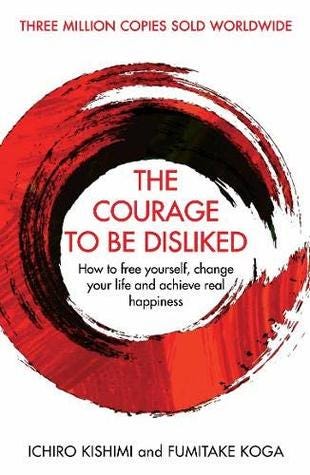The One Book That Will Shift Your Perspective
And help you become the best version of yourself

Books
The One Book That Will Shift Your Perspective
And help you become the best version of yourself
There are times in your life when you come across a book that changes your life forever. Such books stay with you. They leave parts of themselves inside your soul— little bits and pieces that grow in your heart and become you.
The books that are truly impossible to forget.

The Courage To Be Disliked: How to Free Yourself, Change your Life and Achieve Real Happiness by Ichiro Kishimi and Fumitake Koga is one such book for me.
It was an eye-opener — so much, that I have chewed on the knowledge and made it a part of my identity. I made notes on each page and revisit the book almost every year. Not only did it make me aware of all the ways I was wasting my present, but it also helped me come to terms with some hard truths about myself that I was reluctant to face.
Before we begin, let me make it clear that The Courage To Be Disliked is not a self-help book. Rather, it tells us that we do not need to rely on external sources of happiness when everything we need to be happy lies within our own hearts. Happiness is an inherent choice one needs to make every day.
The book is told in the form of a conversation between a youth and a philosopher. It outlines some important tenets of the psychology of the Austrian psychiatrist Alfred Adler and explains them in a way that is not only relatable but also applicable in our day-to-day lives.
Here are 7 of the most important lessons I learned from this book and how they helped make my life better-
1. Past Trauma Does Not Impact Our Lives
According to Alfred Adler, no experience in itself, however traumatic, is a cause of our success or failure. Past trauma can impact our lives only as much as we let it.
In other words, life isn’t something that is given to us. It is what we make of what we have.
We decide how we want to live.
Of course, bad experiences in the past do have serious impacts on the way our personality develops. But this impact is limited to the meaning we ascribe to these experiences. It is possible to interpret a bad situation in a positive manner too. In the author’s words-
People are not driven by past causes but move towards goals they themselves set.
No matter what has happened in our lives till now, it should have no bearing on how we live from now on. The present version of us determines our life. The best we can do is accept whoever we are right now and have the courage to step forward with this acceptance.
2. Anger is a Construct
Anger is not a natural human emotion. It is just a tool we use to communicate our feelings. If we try hard enough, we can actually communicate our feelings without the use of anger.
If you are finding this hard to comprehend, imagine the case of a couple having a heated argument. Both the husband and the wife are hurling insults at each other when suddenly, the doorbell rings. They pause their argument to attend whoever is at the door. In the interim, whichever partner interacts with the newcomer, they do it with a clear head, without shouting or losing their temper. This realisation leads us to —
Anger is a tool that can be taken out as and when needed
Anger can be removed from our demeanour the moment we realise we no longer need to prove our point. In the example above, anger was kept away the moment the doorbell rang. Effectively, the wife isn’t yelling at her husband in anger because she cannot control it. Rather, she is simply using the anger to overpower her husband with a raised voice and thus assert her opinions.
If we can control our emotions, we can control anger too
We are human beings. Whatever we experience, whatever we feel — all of it is happening in our heads. Your emotions are in your power. The way you feel is in your power. If you can control your happiness and your sadness, why can’t you control your anger? You are not a servant of your emotions. Rather, your emotions exist to serve you.
I tried this simple concept in my life. Whenever someone did something wrong with me, I tried to tell them how I felt without brining in the emotion of anger. And guess what, this actually worked! Not only did I get my point across more effectively, but because I was so calm, it helped the other person keep their temper in check too.
Ultimately, anger is a form of communication, and that communication is possible without using anger.
3. The Courage to Change Our Life Lies Within
We like to tell ourselves “life-lie”s so that we don’t have to face whatever it is we are trying to run from. For example, a person who isn’t very interested in familial responsibilities will tell themselves the lie that they are a workaholic. This not only gives them an excuse to keep ignoring their family but also gives them a false sense of security that they are doing it because they truly can’t control it.
Adlerian psychology calls this a lie. A convenient lie we tell ourselves so we do not have to change the status quo, but a lie nevertheless.
I felt this on a deeper level because before I read this book, I always thought I would be a writer one day, but right now, the only thing stopping me was the lack of time due to my current job. But Adlerian psychology says the only reason a person does not move forward with their goal in life is that they are unwilling to expose their work to criticism. As for me, I wanted to be a writer, but I was worried that my writing is not good enough. Rather than trying and failing, I was happily living inside a cocoon, the realm of possibilities.
After all, as long as we have a valid excuse about why we are not living our best lives, we can comfortably shift the blame to some external agency and continue ignoring our responsibilities in peace, right?
The comfort in lying to oneself
According to Adler, there can be some people who don’t want to change so much, that they are NOT willing to sacrifice the pleasures they enjoy now — for example, the time spent in enjoying hobbies. In other words, such people are not equipped with the courage to change their lifestyle. It is easier with things remaining just as they are, even if they have some complaints.
This hit hard.
After reading this book, I started identifying each time I was telling myself another “life lie”. I kept doing this until I could successfully distinguish an excuse and a genuine reason. This helped me bring out the courage to actually put my work in front of the world.
Of course, my writing didn’t improve in one day or my confidence didn’t magically soar. But, step by step, day after day, I got out of the comfort my life lies provided me and started facing the truth.
Because only when you expose your work to criticism, you know where to improve. And when you know where to improve, you can truly move forward in life.

4. The Importance Of Horizontal Relationships
We spend our lives in the pursuit of superiority. This leads us to make the incorrect assumption that success is a ladder and one has to pull the people ahead on them down so they can climb up. This is an example of a vertical relationship. When we make such relationships with the people around us, it makes it difficult for us to believe that it is possible to keep moving forward without competing with others.
What truly needs to be done is to cultivate horizontal relationships. This can be visualized as all the people are on the same level playing field. There are some people who are moving forward faster and others who are behind them. Though the speed and the distance covered might vary, each person is ultimately walking forward. When we think of the people who work with us as if they are walking on the same level playing field with us, this eliminates the sense of competition we feel with them. Now, the pursuit of superiority lies in taking a step forward, and not in aiming to be better and faster than everyone around us.
Getting rid of the feeling of inferiority
When we are conscious of competition, the feelings of superiority and inferiority will automatically arise. Even if one is winning at the completion, there will never be a moment’s peace because of the constant pressure to never let someone else climb higher than them. They can’t really trust other people and the world feels like a perilous place overflowing with enemies.
To get rid of this constant feeling of pressure and dissatisfaction, one needs to cultivate horizontal relationships with the people around us. Also, we need to change the definition of success as “moving forward” and not as “performing better than others”. When we are no longer convinced that “someone else’s success” translates to “my failure”, only then we can truly get rid of the feeling of inferiority and embrace happiness.
5. Seeking Recognition Is Pointless
At the core of Adlerian psychology, is the idea that as humans, we do not live to satisfy other people’s expectations. When one seeks recognition and praise for every action, they inadvertently end up leading a life of following expectations held by other people who want them to be a certain kind of person. In other words, they throw away who they really are and live a life designed for them by the people around them.
True freedom can be achieved when a person no longer cares about what others think of them. They are aware of what task is theirs and theirs alone and do not seek validation from other people for completing their tasks. In other words, true freedom lies in the courage to be disliked.
The authors write about a simple way to understand whose task it is. It can be understood by asking yourself this: who is ultimately going to receive the result brought about the choice that is made?
The importance of the separation of tasks
In this regard, the separation of tasks is important. If we understand clearly what is our task and what is someone else’s, it will save us a lot of time and energy we would have otherwise spent in trying to teach others how to do their job better.
First, one should ask, “Whose task is this?” Then, do the separation of tasks. Calmly delineate up to what point one’s own tasks go, and from what point they become other people’s tasks. And do not intervene in other people’s tasks, or allow even a single person to intervene in one’s own tasks.
The authors stress that when we are disliked by other people, it is proof that we are exercising our freedom. Rather than feeling bad that we cannot please everyone, we should rejoice that, at least, we are living life according to our own principles.
The key to happiness belongs to you
When one is tied to the desire for recognition, their key to happiness resides in the hands of other people. The more praise they crave, the more they believe that they cannot be happy on their own. When receiving praise becomes one’s life goal, are they truly living their life or are they pleasing others so they can get some validation?
Only when one is truly able to separate tasks and have the courage to be disliked, they can be truly happy. In this regard, happiness is an inherent choice that needs to be made every day.
6. The Sense Of Self-Worth
One of the key tenets of Adlerian psychology is for a person to attach their sense of self-worth to how much they are contributing to the community. Rather than depending on judgement for their performance on other people, they should accept their own strengths and weaknesses.
The power of self-acceptance
Before trying to improve on our flaws, it is important to understand that no human being is perfect. Once we have accepted that, we can separate tasks and ascertain what are the things about ourselves that we can actively change and which parts we cannot. Letting go of the things that aren’t within our power will help us focus on what aspects we can improve. Equipped with this knowledge, we can set upon the journey of being the best version of ourselves. This concept is called affirmative resignation in Adlerian psychology.
Embracing emotions
One of the things we cannot change about ourselves is the way we feel about the things that happen to us. So, when we are sad, rather than trying to let go of the sadness, it is healthier to be sad to our heart’s content, and then move on. It is precisely when we try to “escape” this sadness, that we get stuck and find ourselves unable to get past the phase.
The healthy way out is to embrace whatever emotions we are feeling without trying to run away from them or (in case of positive emotions) try to hold on to them for longer than their designated duration.
The circular structure
Self-acceptance, confidence, and contribution to the community aren’t independent entities. The authors argue that these three are connected to each other in a sort of circular structure.
- It is because one accepts oneself as they are, that they can have confidence in themselves.
- When they have confidence in themselves, they can contribute to the community without fearing that they are being taken advantage of.
- When one knows that they are contributing to others, they can have the deep awareness that they are of use to someone just as they are, and this will help them self-accept themselves, flaws and all.
From acceptance to self-love
The authors argue that the greatest unhappiness in a person’s life stems from not being able to love themselves. According to Adler, the simplest solution to this problem is the thought that “I am beneficial to the community” or “I am of use to someone”. This is the only thing that can give one a true awareness that they have worth.
In other words, happiness is the feeling of contribution. That is the Adlerian definition of happiness. If one truly has a sense of contribution, they will no longer seek recognition or validation from others.
7. Life Is Not A Straight Line
Life is not a straight line where we are trying to achieve one goal and call ourselves “failures” if we cannot achieve that goal. Instead, the authors argue that we need to look at life as a series of interconnected dots. These dots are the moments that make up the present. We cannot live in the past or the future. All we can do is live in the present, i.e. make the most of these series of moments called “now”.
Our goals are journeys. There might be circumstances that stop us from reaching where we intended to. But that does not mean the entire journey was a failure. If we make the most of each moment given to us, we can have a happy and stressfree life.
What happened in the past has nothing to with our present. What lies in the future is not in our control anyway. If we are living earnestly here and now, we will not be burdened by the weight of things we have no control over.
Let us dance in earnest the moments of the here and now. Do not look at the past, and do not look at the future. One lines each moment like a dance. There is no need to compete with anyone, and one has no use for destinations. As long as you are dancing, you will get somewhere.
Learning about Adlerian psychology from The Courage To Be Disliked and applying these key points in my life helped change my attitude towards happiness and served as an eye-opener to many uncomfortable truths about myself I was previously afraid to face.
To have a better life, you need to make these seven aspects a part of your psyche. Only with determination and regular practise, will you be able to see a substantial transformation that will help you become a better version of yourself.
If you enjoyed this article, you might enjoy some other book recommendations by me-



For more book reviews, follow me on Goodreads.
